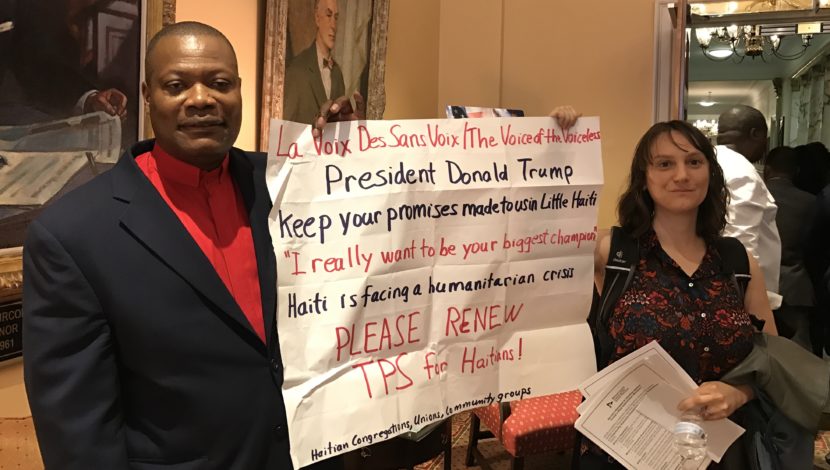The Unitarian Universalist Service Committee advances human rights through grassroots collaborations.
UUSC Responds to Six-Month TPS Extension for Haitians: Not Enough

May 23, 2017
Yesterday, the Department of Homeland Security (DHS) revealed its decision to extend Temporary Protected Status (TPS) for Haitian nationals in the United States for a mere six months, instead of the 18-month window normally granted. This announcement is in line with previous threats of Trump administration officials who have recommended terminating the program at the end of the six-month extension—potentially resulting in the deportation of the nearly 58,000 Haitian immigrants currently living with TPS in the United States. UUSC joins with Haitian and Black immigrant leaders and immigration advocacy groups, including our new partner the UndocuBlack Network, to demand an extension of TPS beyond January 2018.
The consequences of ending TPS status for Haitians will be swift and devastating—Haiti is still in the midst of a humanitarian emergency as it works to recover from a catastrophic 2010 earthquake, a cholera epidemic imported by U.N. peacekeeping forces, and a deadly hurricane last fall. Mass deportations of Haitians would cut off a critical lifeline for the Haitian economy, which currently receives about $1.3 billion a year in remittances from Haitians in the United States. The U.S. economy will also lose an estimated $2.8 billion in GDP over the next decade if this community is deported.
“Numbers cannot do justice, however, to the suffering that would be inflicted on thousands of families by a policy of expanded deportation and separation if TPS expires in six months,” says Hannah Hafter, UUSC Senior Program Leader for Activism. “Many Haitians with TPS have U.S. citizen children who were born in this country and know no other home. They are taxpayers, caregivers, parents, and employees whose loss would be felt by all.”
Our partners at the UndocuBlack Network have joined national efforts to renew TPS status for Haitians and, in alliance with the National Immigration Law Center, have helped to spearhead a recent push to uncover the truth about how the Trump administration made its TPS decision. Their recent refusal to renew TPS for three African countries impacted by the 2014 Ebola epidemic; reports that DHS has been requesting information on criminal offenses committed by Haitian TPS holders; and its renewed deportations to war-ravaged Somali, all point to a clear intention to stigmatize and expel immigrant communities of color.
The U.S. obligation to extend TPS for Haitians is more than a matter of humanitarian conscience. Meaningful extension of the TPS program offers a chance for the United States to do the right thing in a part of the world where, for too long, it has been complicit in generating the social problems that created a need for TPS in the first place. UUSC’s Haitian partners at the Papaye Peasant Movement (MPP), for instance, are working with communities directly impacted by U.S. trade policies and aid dumping, which in many places have devastated the local food economy, fueling the poverty and urban overcrowding that made the 2010 Haitian earthquake so deadly. MPP works to establish sustainable agriculture and recover food sovereignty so that Haitians can build a better future.
UUSC will continue to work with our partners to advance the human rights of Haitians at home and abroad, to call for a further extension of TPS, and to press for permanent legislative solutions that will allow all immigrant communities to live in safety and dignity.
Read This Next
UUSC Recommendations for the Global Compact on Migration
UUSC staff offer remarks at the Second Informal Thematic Session for Global Compact on Migration at the United Nations Headquarters in New York on May 23, 2017. Read More →
Deportations to Iraq Reflect “New Low of Cynicism and Immorality”
UUSC strongly condemns any forced returns to Iraq while the country is still at war and the government cannot or will not ensure the safety of its citizens. Read More →